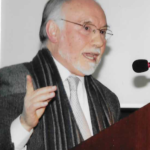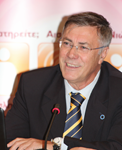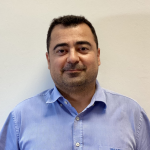| Duration | 18 months, 3 Semesters |
|
Qualification Awarded |
MSc in Addiction Counselling with specialist pathway in Prevention OR MSc in Addiction Counselling with specialist pathway in Intervention |
| Level of Qualification | Postgraduate |
| Language of Instruction | Greek |
| Mode of Study |
Conventional (physical presence) OR Distance Learning |
| Minimum ECTS Credits | 90 |
The mission of the MSc in Addiction Counselling program, with specialist Pathways in Prevention or Intervention, is to offer students cross-cultural exposure to the critical prevention, research and policy issues facing the field.
In our multicultural environment family ties are relaxed. The highly competitive and the universally acknowledged psycho-stressful environment in which we live composes the image of the world of the 21st century. This, in combination with the escalation of every form of addiction – psychoactive substances, gambling, internet abuse etc – constitute a time bomb for the most vulnerable part of our society, the youth.
It is obvious that most of the above problems are transferred to the daily professional practice of health professionals, teachers, social workers and other professionals who deal with the wider society and any of its problems.
The Program follows the internationally successful, and at the same time, accepted practice, of the scientist-professional and consequently offers high quality education in the following areas:
• Targeted theory
• Supervised internship
• Personal development
• Applied research
Counselling is defined as the professional process through which a person with a problem calls and allows another (professional) to have some kind of relationship with him/her.
The provision of counselling services aims at three main axes; namely, the solution of the initial problem, learning and social integration. Resolving the initial problem means first of all, the understanding of the problem by the individual and therefore, the personal acceptance of the problem or dilemma and the consequent actions of the individual in order to change the situation that created or sustained the problem.
Through the professional relationship, the counsellor provides knowledge, skills and strategies that make it easier for the patient to deal with similar difficulties in the future, a process that composes the goal of learning through counselling. Finally, the counselling process contributes to the well-being of both the individual and his environment, but also to the well-being of other people and to the social good.
The provision of counselling services presupposes the development of specific skills by the counsellor. The professional in the implementation of counselling is essentially the carrier of change.
To achieve this, she/he uses all the means and techniques at her/his disposal:
• dialogue,
• interview techniques,
• problem solving algorithms,
• technologies,
in order to bring about change in the life of the individual.
These services are provided on the basis of the methodological and ethical principles that govern a professional counselling relationship and in particular, the provision of the necessary guidance by the counsellor, so that the individual can speak freely, with absolute respect for diversity, in conditions of confidentiality and confirmation.
In order to be able to provide his / her services in the field of addiction prevention and rehabilitation, the counsellor must know both the techniques of providing counselling services, as well as the deontological and ethical issues related to counselling. At the same time, he should know what addictions are, the types of addiction counselling services, the programs that work in the field of prevention and in the field of addiction rehabilitation, but she/he should also possess hours of supervised practical experience that will help him in his professional practice of Counselling.
Therefore, this Program aims to provide the necessary tools to students, based on the acquisition of counselling skills so as to enable them to provide relevant counselling services to the affected fellow human beings.
That is why Philips University aims to create a centre of excellence in Counselling so that graduates acquire the necessary knowledge to practice their profession and at the same time be imbued with a high sense of moral responsibility towards individuals and society in general.
In general, the Program, among other things, provides students with the necessary knowledge for the professional and ethically correct provision of counselling services in matters of addiction.
Among the objectives are
• development by the students of an ethical professional identity, which should guide their work as professionals and as researchers,
• integration of academic, research and professional fields of counselling psychology based on the acquisition of knowledge and experience,
• understanding of the current knowledge related to the specialty of counselling in a way that the graduates can compose and effectively implement specialized counselling interventions in the field of addiction,
• Acquisition of skills for conducting research as well as interpretation / application of quantitative and qualitative findings
The program takes cognizance of the fact that academic courses offered at the University should prepare students to meet the practical needs of industry and the profession.
To be admitted to the program, all candidates must have completed an undergraduate program at any accredited university or its equivalent.
Documentation of the candidate’s education will be required as part of the application for admission
On successful completion of the program, students should be able to:
• develop critical scientific knowledge in the field of addictions as well as related counselling skills
• be able to compose and implement specialized counselling interventions in the field of addictions based on the Code of Professional Ethics of Counsellors
• know about the prevention and rehabilitation programs that operate internationally and domestically and recognize empirically documented counselling techniques in the field of addictions
• conduct research and studies by providing specialized evaluation tools related to counselling and applying the findings to daily practice
• plan and implement individual and / or group counselling interventions at the level of prevention and / or rehabilitation,
• gain the necessary experience in the field, through their supervised internship in approved detoxification prevention and treatment structures.
Students studying for the MSc in Addiction Counselling, including the specialist Pathway, are required to take a minimum of ninety (90) ECTS.
Thirty (30) ECTS come from core courses, thirty (30) ECTS from the Paths and thirty (30) ECTS from the Master’s Thesis.
Four (4) subjects are offered during each semester of the first year and they include an internship of 300 hours, while in the third semester, a thesis of Master’s level (MSc) / an MSc dissertation, needs to be prepared
| Cookie | Duration | Description |
|---|---|---|
| cookielawinfo-checkbox-analytics | 11 months | This cookie is set by GDPR Cookie Consent plugin. The cookie is used to store the user consent for the cookies in the category "Analytics". |
| cookielawinfo-checkbox-functional | 11 months | The cookie is set by GDPR cookie consent to record the user consent for the cookies in the category "Functional". |
| cookielawinfo-checkbox-necessary | 11 months | This cookie is set by GDPR Cookie Consent plugin. The cookies is used to store the user consent for the cookies in the category "Necessary". |
| cookielawinfo-checkbox-others | 11 months | This cookie is set by GDPR Cookie Consent plugin. The cookie is used to store the user consent for the cookies in the category "Other. |
| cookielawinfo-checkbox-performance | 11 months | This cookie is set by GDPR Cookie Consent plugin. The cookie is used to store the user consent for the cookies in the category "Performance". |
| viewed_cookie_policy | 11 months | The cookie is set by the GDPR Cookie Consent plugin and is used to store whether or not user has consented to the use of cookies. It does not store any personal data. |











